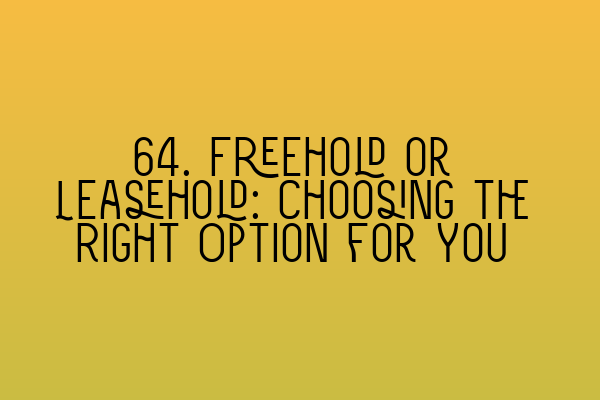64. Freehold or Leasehold: Choosing the Right Option for You
When it comes to purchasing property, one important decision you’ll have to make is whether to opt for a freehold or leasehold ownership. This decision can have far-reaching implications for your future, so it’s crucial to understand the differences between the two options and consider your individual circumstances carefully. In this article, we’ll explore the advantages and disadvantages of freehold and leasehold ownership, helping you make an informed choice that aligns with your needs.
Before we delve deeper, let’s first clarify the meanings of these terms. Freehold ownership refers to owning both the property and the land it stands on outright. On the other hand, leasehold ownership means you have the right to occupy the property for a specified period of time, as outlined in a lease agreement with the freeholder, who retains the ultimate ownership of the land.
Advantages of Freehold Ownership
1. Complete Ownership: As a freeholder, you have absolute ownership and control over the property, giving you the flexibility to make any modifications or alterations as you see fit (subject to local planning regulations).
2. No Ground Rent: Unlike leasehold properties, freehold properties do not require payment of ground rent to the freeholder. This can provide you with long-term cost savings and financial stability.
3. No Leasehold Restrictions: Freehold ownership frees you from the constraints typically associated with leasehold properties. You are not obliged to follow any leasehold rules, preventing potential disputes and providing you with greater autonomy.
Advantages of Leasehold Ownership
1. Lower Purchase Price: Leasehold properties often have a lower initial purchase price compared to freehold properties, making them more affordable for many buyers.
2. Shared Maintenance Responsibilities: In a leasehold property, the freeholder usually takes care of maintenance and repairs to common areas, alleviating some of the responsibilities that come with property ownership.
3. Amenities and Services: Leasehold properties, particularly in apartment complexes or gated communities, often come with access to amenities such as gyms, swimming pools, and concierge services. These features can enhance your lifestyle and provide added convenience.
Disadvantages of Freehold Ownership
1. Responsibility for Maintenance: As a freeholder, you are solely responsible for maintaining and repairing the property, including any associated costs. This can be both time-consuming and expensive, especially for larger properties.
2. Limited Regulation: Unlike leasehold properties, there are fewer regulations and protections in place for freehold owners. This means you bear the responsibility for resolving any disputes or issues that may arise, without the intervention of a freeholder or management company.
3. Limited Shared Facilities: Freehold properties typically do not come with shared facilities or services, which may be considered a disadvantage for those seeking a community-oriented lifestyle.
Disadvantages of Leasehold Ownership
1. Leasehold Terms and Ground Rent: The terms of a leasehold agreement, such as the length of the lease and the ground rent payable, are determined by the freeholder. This lack of control can be a drawback for some buyers.
2. Leasehold Restrictions: Leasehold properties are subject to various restrictions outlined in the lease agreement. These restrictions may include limitations on making alterations, keeping pets, or subletting the property. It’s important to carefully review the lease terms to ensure they align with your lifestyle and future plans.
3. Lease Extensions and Renewals: When the lease term nears expiration, the process of extending or renewing the lease can be complex and costly. Failure to extend the lease can result in the property reverting to the freeholder, leaving you without ownership.
Making Your Decision
Before making a decision, it’s essential to seek professional advice from a property solicitor who specializes in freehold and leasehold transactions. They will help you assess the specific terms of leasehold agreements, discuss any potential implications, and guide you through the legal process.
At SQE Property Law & Land Law, our team of expert solicitors have extensive experience in all aspects of property law. We can assist you in carefully weighing the advantages and disadvantages of freehold and leasehold ownership and help you make an informed decision that aligns with your requirements.
If you’re preparing for your upcoming SQE exams, be sure to check out our related articles for valuable study resources:
– SQE 1 Practice Exam Questions
– SQE 1 Practice Mocks FLK1 FLK2
– SQE 2 Preparation Courses
– SQE 1 Preparation Courses
– SRA SQE Exam Dates
Remember that purchasing property is a significant financial decision, and choosing between freehold and leasehold ownership requires careful consideration. By understanding the advantages and disadvantages of each option and seeking professional guidance, you can make a choice that best suits your needs and secures your future.
